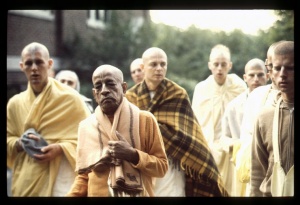CC Antya 3.143 (1975): Difference between revisions
(Vanibot #0027: CCMirror - Mirror CC's 1996 edition to form a basis for 1975) |
(Vanibot #0020: VersionCompareLinker - added a link to the Version Compare feature) |
||
| Line 2: | Line 2: | ||
<div style="float:left">'''[[Sri Caitanya-caritamrta (1975)|Śrī Caitanya-caritāmṛta (1975)]] - [[CC Antya (1975)|Antya-līlā]] - [[CC Antya 3 (1975)|Chapter 3: The Glories of Śrīla Haridāsa Ṭhākura]]'''</div> | <div style="float:left">'''[[Sri Caitanya-caritamrta (1975)|Śrī Caitanya-caritāmṛta (1975)]] - [[CC Antya (1975)|Antya-līlā]] - [[CC Antya 3 (1975)|Chapter 3: The Glories of Śrīla Haridāsa Ṭhākura]]'''</div> | ||
<div style="float:right">[[File:Go-previous.png|link=CC Antya 3.142 (1975)|Antya-līlā 3.142]] '''[[CC Antya 3.142 (1975)|Antya-līlā 3.142]] - [[CC Antya 3.144 (1975)|Antya-līlā 3.144]]''' [[File:Go-next.png|link=CC Antya 3.144 (1975)|Antya-līlā 3.144]]</div> | <div style="float:right">[[File:Go-previous.png|link=CC Antya 3.142 (1975)|Antya-līlā 3.142]] '''[[CC Antya 3.142 (1975)|Antya-līlā 3.142]] - [[CC Antya 3.144 (1975)|Antya-līlā 3.144]]''' [[File:Go-next.png|link=CC Antya 3.144 (1975)|Antya-līlā 3.144]]</div> | ||
{{CompareVersions|CC|Antya 3.143|CC 1975|CC 1996}} | |||
{{RandomImage}} | {{RandomImage}} | ||
==== TEXT 143 ==== | ==== TEXT 143 ==== | ||
<div class="verse"> | <div class="verse"> | ||
:veśyāra caritra | :veśyāra caritra dekhi' loke camatkāra | ||
:haridāsera mahimā kahe | :haridāsera mahimā kahe kari' namaskāra | ||
</div> | </div> | ||
| Line 18: | Line 17: | ||
<div class="synonyms"> | <div class="synonyms"> | ||
veśyāra—of the prostitute; caritra—character; | veśyāra—of the prostitute; caritra—character; dekhi'-seeing; loke—all people; camatkāra—astonished; haridāsera—of Ṭhākura Haridāsa; mahimā—glories; kahe—speak; kari' namaskāra—offering obeisances. | ||
</div> | </div> | ||
Latest revision as of 01:03, 27 January 2020

A.C. Bhaktivedanta Swami Prabhupada
TEXT 143
- veśyāra caritra dekhi' loke camatkāra
- haridāsera mahimā kahe kari' namaskāra
SYNONYMS
veśyāra—of the prostitute; caritra—character; dekhi'-seeing; loke—all people; camatkāra—astonished; haridāsera—of Ṭhākura Haridāsa; mahimā—glories; kahe—speak; kari' namaskāra—offering obeisances.
TRANSLATION
Seeing the sublime character of the prostitute, everyone was astonished. Everyone glorified the influence of Haridāsa Ṭhākura and offered him obeisances.
PURPORT
It is said, phalena paricīyate: one is recognized by the result of his actions. In Vaiṣṇava society there are many types of Vaiṣṇavas. Some of them are called gosvāmīs, some are called svāmīs, some are prabhus, and some are prabhupāda. One is not recognized, however, simply by such a name. A spiritual master is recognized as an actual guru when it is seen that he has changed the character of his disciples. Haridāsa Ṭhākura actually changed the character of the professional prostitute. People greatly appreciated this, and therefore they all offered obeisances to Haridāsa Ṭhākura and glorified him.